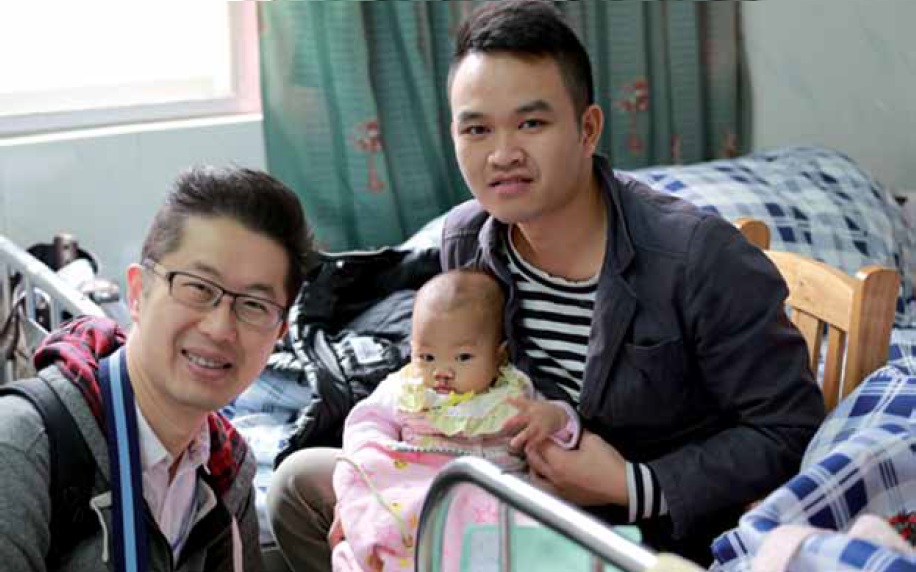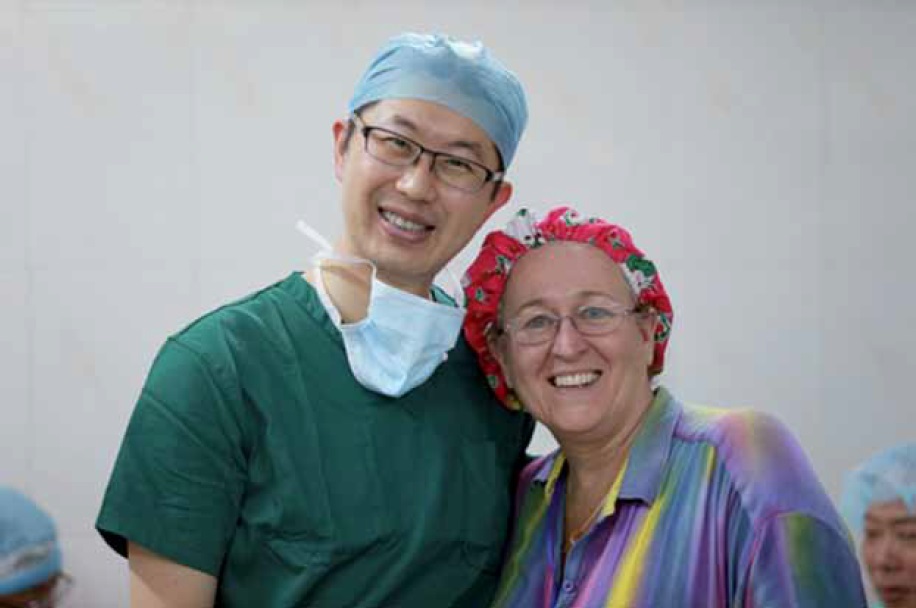Hong Kong Med J 2014;20:84–5 | Number 1, February 2014
© Hong Kong Academy of Medicine. CC BY-NC-ND 4.0
DOCTOR FOR SOCIETY
Psychiatry with a scalpel—making smiles, changing lives: Interview with Dr Peter Pang
Winnie Sung, Clara Tsui
Year 3, Faculty of Medicine, The Chinese University of Hong Kong
What is the difference between finishing a task, and
completing it? To finish a task, one uses it as a means
to an end; but to complete a task, one must go above
and beyond these expectations, and satisfy one’s
greatest judge: oneself.
To Dr Peter Pang, this distinction is the key
to his approach to life. He trains himself to think
outside the box and aspires to do more than what
is socially expected, and these motivations drive his
charity work.
Making smiles around the world
Dr Pang is a plastic surgeon who was awarded
the Hong Kong Humanity Award in 2011 for
his community services in Operation Smile
International and Rotary International District
3450. After graduating from the Chinese University
of Hong Kong in 1994, he started practising at the
Prince of Wales Hospital and the Union Hospital. In
1999, his mentor inspired him to start a new journey
and he volunteered to work in humanitarian aid with
Operation Smile International. This commitment
took him on missions to various countries including
China, the Philippines, Kenya, and Cambodia, where
he and his colleagues offered free surgery for patients
with cleft lips and cleft palates.
In 2005, he joined the executive board of
Operation Smile China Medical Mission. Through
collaboration with his colleagues, he set up the first
Operation Smile Charity Hospital in Hangzhou
and Kunming, which made medical care accessible
to children suffering from cleft lip in the region. Currently, Dr Pang works in the Paragon Clinic in
Central and continues his humanitarian work as
President of the Rotary Club in the New Territories.
Patient needs, limited resources, and tough
decisions
An overarching theme of responsibility towards people
with limited resources colours Dr Pang’s illustrious
career. Cleft lip, although not life-threatening, has
a serious impact on quality of life. Apart from the
detriment to self-image and confidence, having a
cleft lip also hinders speech and teeth development
in children, which results in lifelong social, financial,
and medical problems. In his 10 years of service with
Operation Smile, Dr Pang has firsthand experience
of the overwhelming need for cleft lip operations,
postoperative speech training, and dental correction.
He was frustrated that he could only perform about
40 operations per annual trip due to resource and
logistical limitations. So, drawing inspiration from his
role model Professor Arthur Li, Dr Pang traded the
gratification of volunteerism for administrative work
to recruit more doctors and exponentially increase
the number of children he could help. However, as
an administrator, Dr Pang faced new challenges and
had to make tough decisions. What was to be the age
limit for children to receive corrective surgery? Who
had higher priority? Who should benefit the most
from the given resources?
Surgery: psychiatry with a scalpel?
Dr Pang refers to plastic surgeons as “psychiatrists with scalpels”. He shares several stories to illustrate
his point. On a mission in China, Dr Pang met a family
with cleft lips in three consecutive generations. The
elderly grandmother, who was wheelchair-bound,
made a point to kneel and beg the doctors to operate
on her daughter and granddaughter. He also met
two brothers, aged 17 and 18 years, who both saw
Operation Smile as a chance to change their school
and job prospects. However, when the younger
brother was offered the operation, he requested that
the doctors operate on his brother instead, to help
further the brother’s career. Dr Pang also recalls
encountering a child with a cleft lip that had never
been kissed by his parents, because they had been
afraid to. Immediately after the operation, the child
said he wanted to kiss his parents, and was finally
able to show and receive the kind of parent-child affection that most people take for granted. Such
examples illustrate how Dr Pang’s operations go
beyond restoring physical appearances: with the
scalpel, by substantially changing the lives of his
patients and giving them hope. In turn, Dr Pang
witnessed humanity and selfless love, and in giving
hope for the future, he felt he was bringing his work
to completion.
Operation Smile and the future
Operation Smile continues to thrive for the
betterment of children worldwide. As of writing,
27 more missions are planned in 2014, and will
encompass countries in Southeast Asia to South
America. For more information on the organisation’s
work and for ways to contribute, please visit www.operationsmile.org.



